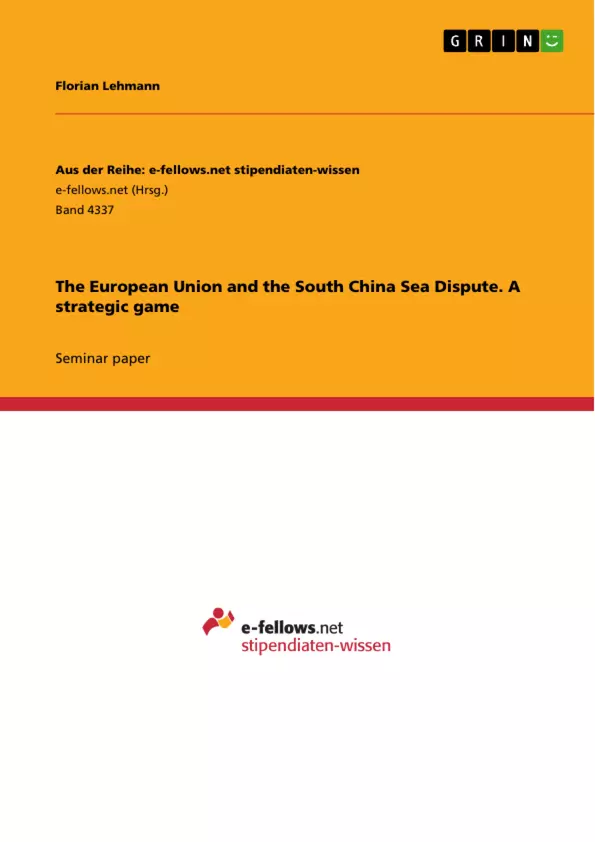The text discusses the European Union's (EU) interest and involvement in the South China Sea (SCS) despite having no territorial claims in the region. It outlines various reasons for the EU's presence, including economic advantages for its member states, the EU's aim to play a more active role in geopolitics, and the need to protect vital maritime routes for European supply chains.
Highlighting the importance of the SCS for Europe's security in trade, the text emphasizes the necessity for the EU to play a role in the conflict. It acknowledges the complexity of individual relationships between EU member states and the countries involved in the SCS dispute, requiring a delicate balance in EU engagement while addressing requests for active contribution from affected partners.
Additionally, the text underscores the EU's commitment to upholding the rule of law and its goal of establishing a stronger geopolitical position. It discusses the need for the EU to navigate relationships with both partners and potential opponents, promoting cooperation and outlining potential objectives for the ASEAN Regional Forum.
Lastly, the paper focuses on France's direct involvement in the conflict, emphasizing the EU's obligation to represent the interests of all its members and take action to ensure the safety of its citizens and the recovery of a lost vessel.
Overall, the text outlines the EU's interests, its stance within the SCS conflict, its relationships with involved actors, and potential objectives aimed at achieving its overarching goals within the ASEAN Regional Forum.
Inhaltsverzeichnis (Table of Contents)
- Introduction
- The European Union's Interests in the South China Sea Dispute
- The European Union's general interest
- Taking on a more prominent role in the Indo-Pacific
- Maintaining order and securing trade routes
- Reevaluating EU-China-relations
- Assessment of the South China Sea Dispute
- General assessment of the conflict
- Particular assessment of the conflict regarding the scenario
- The European Commission's dilemma: An aggregate of diverse stakeholders
- The EU and its external relations
- The urgency to define partners and potential adversaries
- The EU's friends and allies
- Opponents and strategic rivalries
- What does the EU have to offer?
- Possible realistic aims of the European Commission to enforce its interests
- Overall goals of the European Union
- Protecting supply chains and travel routes
- Defending the values of the EU
- Establishment and progression of old and new partnerships
- List of References
Zielsetzung und Themenschwerpunkte (Objectives and Key Themes)
This strategic paper explores the European Union's (EU) involvement in the South China Sea (SCS) dispute, examining its interests, positioning, and potential objectives within the conflict. The paper analyzes the EU's commitment to maintaining a presence in the region due to economic advantages, its ambition to become a more active geopolitical player, and its need to defend the interests of its member states. It delves into the EU's complex relationship with China, highlighting the challenges of balancing economic interests with core values.
- The EU's interests in the South China Sea
- The EU's role in maintaining order and securing trade routes
- The EU's complex relationship with China
- The EU's commitment to promoting its values of freedom and democracy
- The EU's ambition to become a more active geopolitical player
Zusammenfassung der Kapitel (Chapter Summaries)
The introduction establishes the EU's non-territorial claims in the SCS but highlights its interests in maintaining a presence in the region due to economic advantages, its ambition to become a more active geopolitical player, and the need to defend the interests of its member states. The paper emphasizes the significance of the SCS for European security, including supply chains, trade routes, and the rule of law.
The first chapter examines the EU's general interests in the South China Sea dispute. It highlights three key objectives: taking on a more prominent role in the Indo-Pacific, maintaining order and securing trade routes, and re-evaluating EU-China relations. The chapter discusses the EU's commitment to its core values, its economic interests in the region, and its complex relationship with China.
The second chapter provides a general assessment of the South China Sea conflict, outlining its historical context and the claims of the involved parties. It explores the importance of the SCS in terms of natural resources and maritime trade routes. This chapter also emphasizes the complexities of the dispute, highlighting the conflicting claims and potential for escalation.
The third chapter focuses on the EU's external relations in the context of the South China Sea dispute. It discusses the importance of defining partners and potential adversaries, outlining the EU's relationships with key actors in the region, including ASEAN. This chapter also explores the challenges of balancing relationships with different countries involved in the conflict, including China.
The fourth chapter examines the possible realistic aims of the European Commission in enforcing its interests in the South China Sea. It outlines the EU's overall goals, including protecting supply chains and travel routes, defending its values, and establishing and progressing partnerships with other actors.
Schlüsselwörter (Keywords)
The key concepts and themes explored in this paper include the European Union's involvement in the South China Sea dispute, its interests in the region, its role in maintaining order and securing trade routes, its complex relationship with China, and its commitment to promoting its values of freedom and democracy. The paper also examines the EU's ambition to become a more active geopolitical player and its efforts to balance its interests with those of its member states.
- Quote paper
- Florian Lehmann (Author), 2022, The European Union and the South China Sea Dispute. A strategic game, Munich, GRIN Verlag, https://www.grin.com/document/1430097



